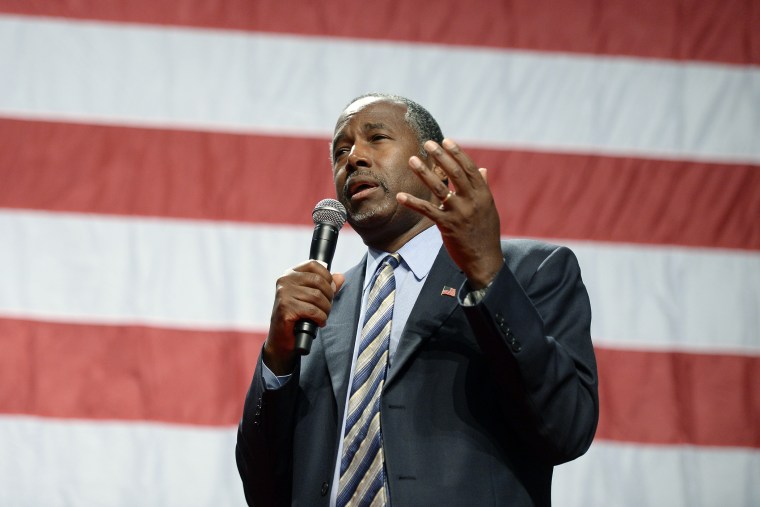For months, the pattern has been largely consistent. Ben Carson says something outlandish, offensive, or both, which sparks a media controversy. Carson sticks to his ridiculous position, his poll numbers will go up, and the political world moves on to his next outrageous comment. Rinse and repeat.
But this week offers something a little different: a Carson lie.
The trouble stems from this exchange in Wednesday's Republican debate, when CNBC debate moderator Carl Quintanilla
asked Carson about a controversial part of his background.
QUINTANILLA: This is a company called Mannatech, a maker of nutritional supplements, with which you had a 10-year relationship. They offered claims that they could cure autism, cancer, they paid $7 million to settle a deceptive marketing lawsuit in Texas, and yet you're involvement continued. Why? CARSON: Well, that's easy to answer. I didn't have an involvement with them. That is total propaganda, and this is what happens in our society. Total propaganda.
National Review, one of the most influential outlets in conservative media, described the Republican's rhetoric as "
bald-faced lies" -- which is generally a phrase GOP candidates try to avoid in
National Review.
I think there are three basic angles to the story. The first is reality: Carson had a “
long and personal involvement with Mannatech,” which he maintained over several years. As MSNBC's Jane C. Timm
reported yesterday, "Carson appears in
video after
video speaking positively about Mannatech and how it helped him fight cancer -- so much so he even considered forgoing surgery -- and continued working with Mannatech even after they paid $7 million to settle charges of 'illegal' and 'deceptive' advertising brought by Texas’ attorney general’s office in 2009."
The second angle is a look at Carson's judgment. For all of his alleged expertise as a medical professional, the Republican neurosurgeon has endorsed some extraordinarily unusual beliefs. The
Wall Street Journal reported earlier this month:
Faced with a prostate-cancer diagnosis more than a decade ago, Ben Carson, the Republican presidential hopeful and retired surgeon, consulted an unusual source: the medical director of a Texas company that sells nutritional supplements made of substances such as larch-tree bark and aloe vera extract. The company doctor “prescribed a regimen” of supplements, Mr. Carson told its sales associates in a 2004 speech. “Within about three weeks my symptoms went away, and I was really quite amazed,” he said to loud applause, according to a YouTube video of the event.
Even at this week's debate, as part of his answer, Carson added, "Do I take the product? Yes. I think it's a good product."
We know Carson isn't particularly familiar with public policy or government, but it now appears reasonable to also wonder just how much he knows about medicine.
And finally, there's also the debate question itself. Carson dismissed the entire line of inquiry as "total propaganda," and he added yesterday that the question was "very unfair." Around the same time, however,
his spokesperson said that these questions are “absolutely” fair and not “gotcha” questions. Who's right, the candidate or the candidate's spokesperson?
The usual flap surrounding Carson tends to be about his preoccupation with Nazis and slavery, but this is a qualitatively different kind of story. How will the GOP candidate respond to fair allegations that he lied to a national television audience?
